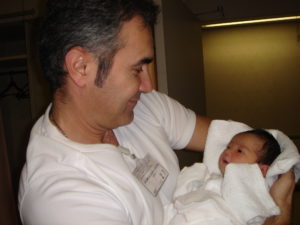My breastfeeding story
2016-08-08
© 2008/Dorobsho Khushvakhtov
Trying to breastfeed my newborn daughter, Pari. It was a big struggle.
When my daughter, Pari – my very first child – was born, I was 47 years old, and literally had not a single drop of breastmilk.At the only Baby-Friendly Hospital in Tokyo, my hometown, I tried day and night to breastfeed my little baby, with support from the nurses. No success. As a UNICEF staff member who had been promoting breastfeeding for years as part of my job, I was so embarrassed! Still, I had no choice but to use substitute milk.
My dream was to exclusively breastfeed my baby for at least six months. I was convinced this was the best way to feed newborn babies, for the sake of their nutrition and their psychological bond with their mothers. I used to visit maternity wards as part of my work, and tell all the mothers I met, “You should have six months of exclusive breastfeeding, period!”
How could I not implement what I believed in so much? I was determined. Rather than giving up, I simply continued to let Pari suck and suck and suck, although she still had to be fed substitute milk.

© 2008/Yukie Mokuo
My husband with my newborn daughter, Pari. His support was one of the critical factors that made my breastfeeding possible.
And so began my great struggle to breastfeed, when it seemed almost impossible.
Things slowly changed – I started producing a tiny little bit of breastmilk in the first month. My daughter was happy to suck my easts, especially in the middle of the night – it gave her comfort.
I was lucky to find a good massage for breastfeeding support in my neighbourhood, and I went there every week. I got very good advice on how to hold the baby while feeding, how to let her suck, how to improve my diet, and how to get into a daily routine.
The ratio of substitute milk to breastmilk gradually shifted, from 80/20 to 60/40 and then 50/50 to 30/70. By the end of the third month, it was 10/90. At that point, there was another problem, which I was not conscious of: I lacked the self-confidence to breastfeed exclusively, assuming I would always need substitute milk. I did not realise that I was already breastfeeding my baby quite well.
One day, finally, my breastfeeding adviser scolded me: “What are you afraid of? Do you think your baby will die from not having the bottle? Just drop it!”
Bravo! In the fourth month, I made my dream come true. Pari continued with exclusive breastfeeding until she was six months old, when she started complementary feeding.
I returned to work at UNICEF when she was nine months old. Everything was quickly back in full swing at work, but I continued breastfeeding her at night. You may think it’s hard to breastfeed a baby at night, after a full day of work. But believe me – it was a joy! These were beautiful moments. Feeding her in the middle of the night – our own precious time to nurture our close bond – gave me good energy to go back to work the next day.
When Pari was 18 months old, I had to go on a weeklong business trip. I thought this would end my breastfeeding. Believe it or not, after one week’s eak I still produced breastmilk, because my daughter wanted to continue!

© 2010/Dorobsho Khushvakhtov
The last time I breastfed Pari, at age 2
We stopped when she turned 2 years old. I was going on another business trip, this time for two weeks. The eak was unavoidable, and I made a conscious decision that the time had come to stop breastfeeding.
After my return home, Pari gave one loud cry when she was refused my easts – but only one, then she was absolutely ok. I was the one who missed it – something precious, that does not happen anymore.
Over the two years that I breastfed her, my daughter and I developed a special bond. It lasts. Pari is now turning 8 – yet our psychological bond remains. We feel the same feelings when we cuddle before she goes to bed.
I know what it takes now. I managed it because my husband and family were very supportive, I had time off work, I was able to afford massages and counseling – I must admit I was privileged. Not everyone has such privileges. For women, breastfeeding a baby is not a simple matter. It is painful. It takes nerve, determination, and good energy.
Nonetheless, what you gain from breastfeeding your baby is something you cannot substitute with anything else! It is not only the best nutrition for the baby, it is immunity, protection for the baby’s health, a strong psychological and physical bond with your child, and joy and happiness for the family.
By all means, mothers need support – they should not be left to themselves. Husbands, partners, families, the workplace, whole communities and societies should support them. Don’t be shy – demand and seek advice and help, especially from professionals. Reach out to get the information you need.
Yet the most important thing, I believe, is your confidence – a mother’s confidence to breastfeed. It has to come from your inner self.
If I found that confidence, I am sure you can.
Yukie Mokuo is the UNICEF Representative in Kyrgyzstan.









